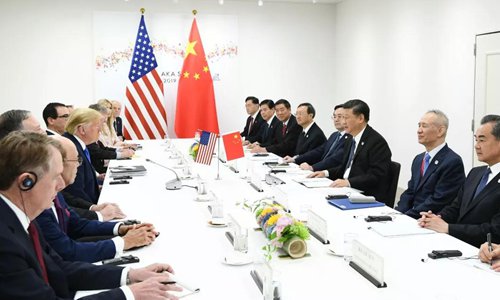HOME >> CHINA
China sincere in continuing trade talks with US:Xi
Source:Global Times Published: 2019/6/29 14:01:04 Last Updated: 2019/6/29 14:07:07

Photo: Xinhua
Chinese President Xi Jinping and US President Donald Trump have agreed to restart trade consultations on equal terms, the Xinhua News Agency reported on Saturday.
The latest development in the year-long trade war between the world's two largest economies followed the widely anticipated meeting between Xi and Trump on the sidelines of the Osaka G20 summit. The meeting, lasting for around 80 minutes, ended at 1 pm local Japanese time.
Xi said that China is sincere in continuing trade negotiations and managing differences with the United States.
However, negotiations should be based on equality and mutual respect and address each other's legitimate concerns, he stressed
Trump said that the US will not impose new tariffs on Chinese exports. He noted that the US side hopes to solve the trade imbalance through negotiations and provide fair treatment to firms in China and the US. Trump added he hopes China could increase imports from the US,according to Xinhua.
The US is willing to reach a trade agreement with China that both sides could accept, and such consensus would be of great historical significance, the US president said.
Xi called on the US to accord fair treatment to Chinese enterprises and students to allow normal business cooperation and people-to-people exchanges between the two countries.
Trump said he harbors no hostility toward China and hopes for better relations between the nations.
Trade teams from the two countries will further discuss detailed issues.
China and the US share common ground in creating an expectation on dividends from sustaining their cooperation, said Bai Ming, deputy director of the Ministry of Commerce's International Market Research Institute.
"The US is facing economic pressure, in part from the trade tariffs war, and Trump needs a sound US economic performance for the upcoming presidential election," Bai told the Global Times on Saturday.
The model on which trade consultations work will be re-clocked to December 2018 while the basis on which consultation can be continued is re-clocked to May, Bai said. Negotiations broke down in May and the US government increased additional tariffs on $200 billion worth of Chinese imports.
"Since the US has a record of walking away from deals, so we can only have cautious optimism," Bai said.
Posted in: DIPLOMACY